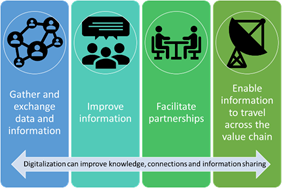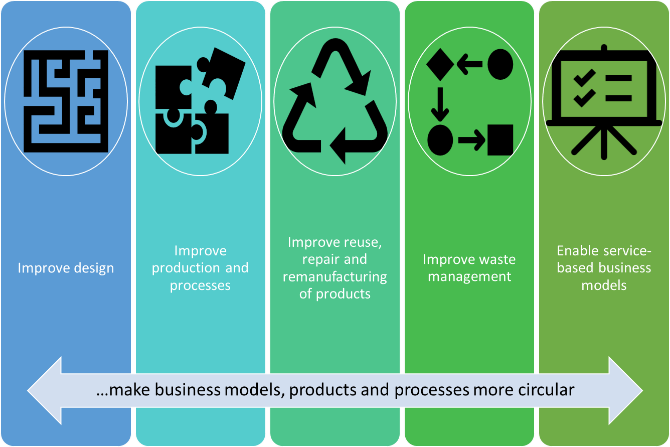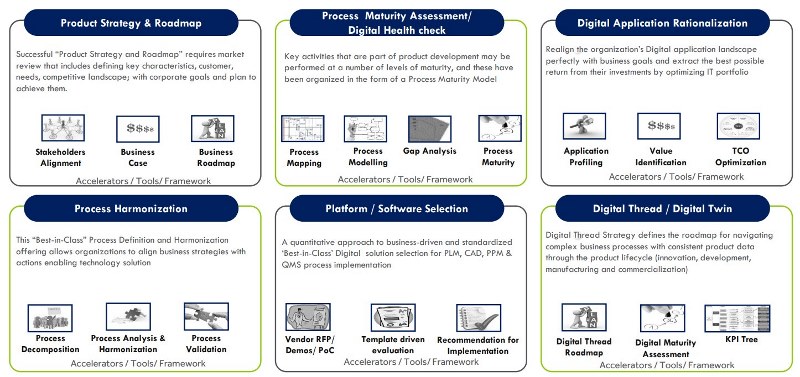Digitalization as an Enabler for a Circular Economy
Written by Vijay Karna 04 Apr, 2023
Creating smart and sustainable solutions has become a key focus area across industries. From manufacturers to consumers, everyone wants to adopt eco-friendly solutions to combat climate doom and eco-stress. However, one of the most challenging issues today is creating a sustainable Circular Economy (CE).
A circular economy is an economic model that aims to create a closed-loop system in which resources are kept in use for as long as possible, minimizing or eliminating waste and pollution. The idea is to design out waste and pollution at the outset by keeping materials and products in use, regenerating natural systems, and minimizing resource use. The circular economy aims to replace the traditional linear take-make-dispose model with a more sustainable approach where materials are reused, remanufactured, recycled, or biodegraded. This approach benefits the environment, creates economic opportunities, generates cost savings, and supports job creation. The circular economy is a key strategy for achieving sustainable development goals and addressing global challenges such as climate change, resource scarcity, and pollution.
Digitalization to Boost a Circular Economy
Digitalization is not a readymade solution that will instantly address all issues of development and scalability of solutions. However, if well-managed, it can be a facilitator and accelerator for positive changes and overcoming barriers. Since digitalization aims to address complexity, using data and digitally-enabled solutions offers vast scope to take up the sustainability challenge.
The transition to digital is happening quickly. Approximately 60% of people on the planet have an Internet connection. Two-thirds of the people use a mobile device. Our economies, cultures, communications, occupations, and the necessary skills for today and the future are all changing as a result of digitalization.
The question remains: Should we create framework conditions that exploit the vast possibilities of digitization, maximize them, and minimize undesirable consequences? Data and digital-enabled solutions such as online platforms, smart devices, artificial intelligence (AI), the Internet of Things (IoT), and blockchain are already being used to support the transition to sustainable CE. They are used to improve waste management, including design, production, consumption, reuse, repair, remanufacturing, and recycling. If properly managed, data and digital-enabled solutions can contribute to system-wide transitions, further enhancing connectivity and information sharing across value chains. Making products, processes, and services more circular can be achieved as follows:
- Improved data management to enhance information and knowledge can drive better policymaking and implementation of existing legislation, raise awareness, and guide action, as shown in the infographic below. Digitally-enabled solutions facilitate connections and partnerships between stakeholders and help move information along the value chain along with products and materials.

- Better data management and digitally enabled solutions support more sustainable business models, contribute to more circularity, and improve how we manage design, manufacture, use, reuse, repair, and waste (including recycling), as shown here.

- Digitization can be used to inform, educate, and influence people, to enable them to make sustainable decisions, make them active participants in the data economy, and co-create knowledge.
Cyient’s Digital Engineering and Technologies (DET) practice can help organizations use digitalization to drive a circular economy. Our solutions—
- Examine how better data management and digitally enabled solutions can improve knowledge, connectivity, and information sharing.
- Facilitate service-based business models, and explore the potential for digitization to make business models, products, and processes more circular. Designing, manufacturing, reusing, repairing, disassembling, or improving the durability of products and Improving Waste Management.
- Explore ways to influence and empower users and consumers during the transition from linear to circular economy.
- Consider undesirable consequences when combining digitalization and CE to overcome the fundamental barriers to the digital economy and the challenges and risks associated with the digital revolution.
- Provide an overview for action, including the climate, circular economy, digital, and industry agendas (including the Internal Market) and consumer issues and research and development. Looking at how we can use its governance, economic tools, and convening powers to facilitate the transition to a sustainable digital and circular economy.
All of the above are enabled by our consulting offerings outlined below.

Given how digitalization is becoming the pivot around which our current lifestyle and future revolve, businesses must identify and adopt disruptive technologies that shape their investments, market opportunities, and decision-making. Digitalization of products and processes has enabled four key capabilities for enterprises, including monitoring, control, optimization and efficiency, and autonomy.

With numerous disruptive technologies highlighted in our Megatrends report transforming our lives every day, leveraging these platforms to drive a sustainable future has become imperative. Digitalization can enable the development of new business models, such as shared platforms and e-commerce, which can reduce the environmental impact of transportation and increase the efficient use of resources. In addition, digital technologies can enhance transparency and traceability in supply chains, promoting ethical and sustainable sourcing and reducing waste and environmental impact. Digitalization is a powerful tool for promoting sustainability and enabling the transition to a more resource-efficient, low-carbon, and socially-inclusive economy.
To learn more about how CYIENT can help, please reach out to Cyient DET Practice at: DETAdvisory@cyient.com
About the author
Vijay is a Sustainability Reporting Practitioner and Digital Transformation Consultant at Cyient. He helps clients realize business value with expertise in designing business processes to improve customer experience, increase profitability, and provide a competitive edge. He has an extensive experience in leading circularity and implementing digital readiness on sustainable business models, product and service portfolios, market and customer access, value chains and processes, IT architecture, compliance, organization, and culture.
.png?width=774&height=812&name=Master%20final%201%20(1).png)